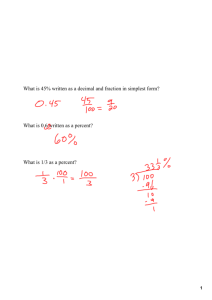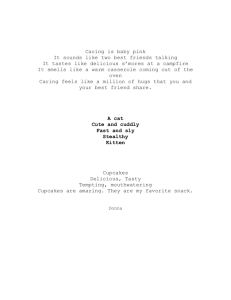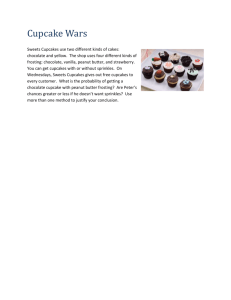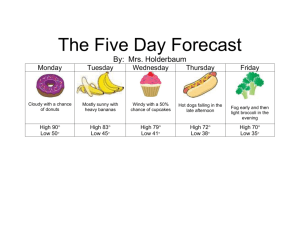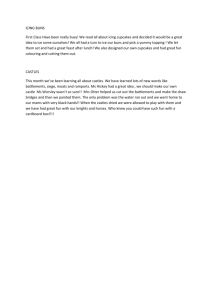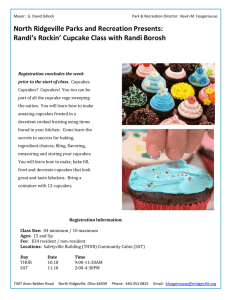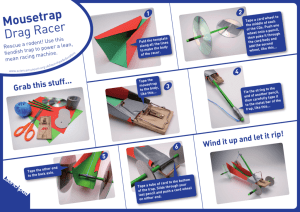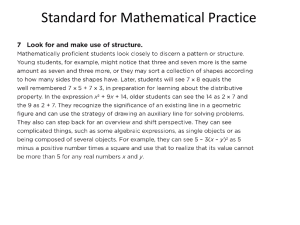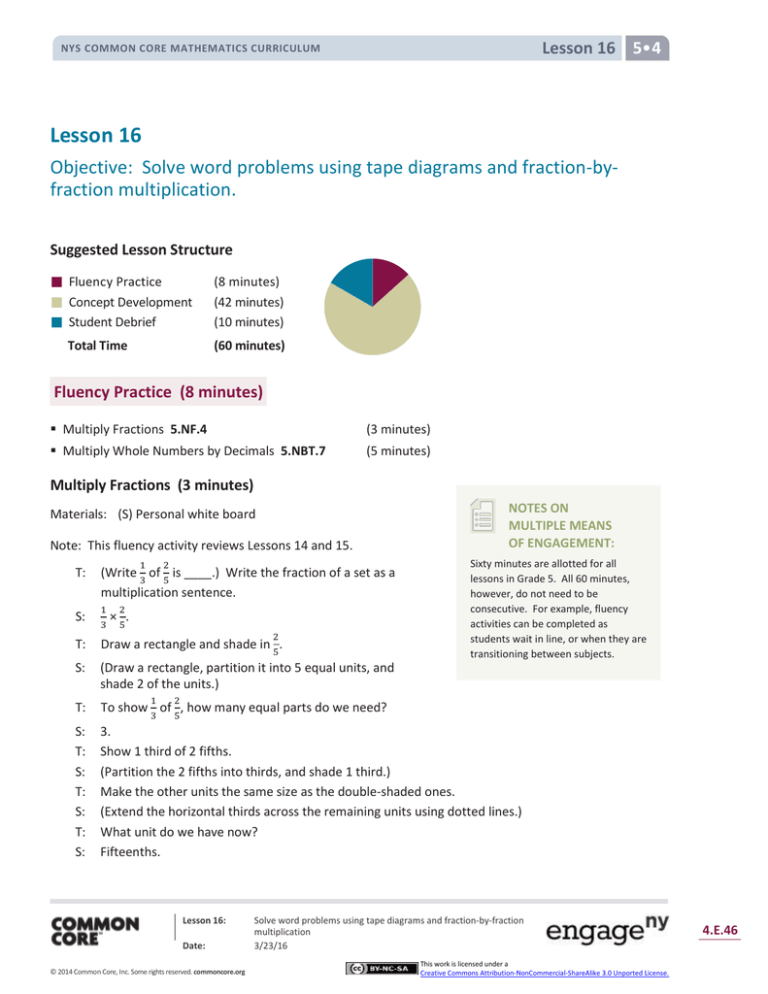
Lesson 16 5 4
NYS COMMON CORE MATHEMATICS CURRICULUM
Lesson 16
Objective: Solve word problems using tape diagrams and fraction-byfraction multiplication.
Suggested Lesson Structure
Fluency Practice
Concept Development
Student Debrief
Total Time
(8 minutes)
(42 minutes)
(10 minutes)
(60 minutes)
Fluency Practice (8 minutes)
Multiply Fractions 5.NF.4
(3 minutes)
Multiply Whole Numbers by Decimals 5.NBT.7
(5 minutes)
Multiply Fractions (3 minutes)
Materials: (S) Personal white board
Note: This fluency activity reviews Lessons 14 and 15.
T:
1
2
(Write 3 of 5 is ____.) Write the fraction of a set as a
multiplication sentence.
2
5
NOTES ON
MULTIPLE MEANS
OF ENGAGEMENT:
Sixty minutes are allotted for all
lessons in Grade 5. All 60 minutes,
however, do not need to be
consecutive. For example, fluency
activities can be completed as
students wait in line, or when they are
transitioning between subjects.
S:
1
3
T:
Draw a rectangle and shade in 5.
S:
(Draw a rectangle, partition it into 5 equal units, and
shade 2 of the units.)
T:
To show of , how many equal parts do we need?
S:
T:
S:
T:
S:
T:
S:
3.
Show 1 third of 2 fifths.
(Partition the 2 fifths into thirds, and shade 1 third.)
Make the other units the same size as the double-shaded ones.
(Extend the horizontal thirds across the remaining units using dotted lines.)
What unit do we have now?
Fifteenths.
× .
2
1
3
2
5
Lesson 16:
Date:
© 2014 Common Core, Inc. Some rights reserved. commoncore.org
Solve word problems using tape diagrams and fraction-by-fraction
multiplication
3/23/16
This work is licensed under a
Creative Commons Attribution-NonCommercial-ShareAlike 3.0 Unported License.
4.E.46
Lesson 16 5 4
NYS COMMON CORE MATHEMATICS CURRICULUM
T:
S:
T:
How many fifteenths are double-shaded?
2.
Write the product and say the sentence.
S:
(Write 3 × 5 = 15.)
1
2
2
1
3
2
of 5 is 2 fifteenths.
Continue this process with the following possible sequence:
2
3
2
×5,
3
5
2
3
3
× 3 , and 5 × 4.
Multiply Whole Numbers by Decimals (5 minutes)
Materials: (S) Personal white board
Note: This fluency exercise prepares students for Lessons 17 and 18.
T:
(Write
S:
1
10
1
1
10
+
1
10
1
+
1
10
). Say the repeated addition sentence with the answer.
3
+ 10 + 10 = 10.
3
T:
(Write 3 × ____ = 10.) On your personal white board, write the number sentence, filling in the
missing number.
S:
(Write 3 ×
T:
(Write 3 ×
S:
(Write 3 ×
T:
S:
(Write 3 × 0.1 = 0.____.) Say the missing digit.
3.
1
10
1
10
1
10
=
3
.)
10
= 3 × 0.____.) Fill in the missing digit.
= 3 × 0.1.)
Continue with the following expression:
T:
S:
T:
S:
1
10
1
1
1
1
+ 10 + 10 + 10 + 10.
(Write 7 × 0.1 = ____.) On your personal white board, write the number sentence with the answer.
(Write 7 × 0.1 = 0.7.)
(Write 7 × 0.01 = ____.) Try this problem.
(Write 7 × 0.01 = 0.07.)
Continue this process with the following possible sequence: 9 × 0.1 and 9 × 0.01.
1
T:
(Write 20 × 10 = ____.) On your personal white board, write the number sentence with the answer.
S:
(Write 20 × 10 = 10 = 2.)
T:
S:
T:
S:
(Write 20 × 0.1 = ____.) Try this problem.
(Write 20 × 0.1 = 2.)
(Write 20 × 0.01 = ____.) Try this problem.
(Write 20 × 0.01 = 0.2.)
1
20
Continue this process with the following possible sequence: 80 × 0.1 and 80 × 0.01.
Lesson 16:
Date:
© 2014 Common Core, Inc. Some rights reserved. commoncore.org
Solve word problems using tape diagrams and fraction-by-fraction
multiplication
3/23/16
This work is licensed under a
Creative Commons Attribution-NonCommercial-ShareAlike 3.0 Unported License.
4.E.47
Lesson 16 5 4
NYS COMMON CORE MATHEMATICS CURRICULUM
1
T:
(Write 15 × 10 = ____.) On your personal white board, write the number sentence with the answer.
S:
(Write 15 × 10 = 10.)
T:
S:
T:
S:
(Write 15 × 0.1 = ____.) Write the number sentence and answer as a decimal.
(Write 15 × 0.1 = 1.5.)
(Write 15 × 0.01 = ____.) Try this problem.
(Write 15 × 0.01 = 0.15.)
1
15
Continue with the following possible sequence: 37 × 0.1 and 37 × 0.01.
Concept Development (42 minutes)
Materials: (S) Problem Set, personal white board
Note: Because today’s lesson involves students in learning a new type of tape diagram, the time normally
allotted to the Application Problem has been used in the Concept Development to allow students ample time
to draw and solve the story problems.
Note: There are multiple approaches to solving these problems. Modeling for a few strategies is included
here, but teachers should not discourage students from using other mathematically sound procedures for
solving. The dialogues for the modeled problems are detailed as a scaffold for teachers unfamiliar with
fraction tape diagrams.
Problem 2 from the Problem Set opens the lesson and is worked using two different fractions (first 1 fifth,
then 2 fifths), so that diagramming of two different whole–part situations may be modeled.
Problem 2
1
1
Joakim is icing 30 cupcakes. He spreads mint icing on of the cupcakes and chocolate on of the remaining
5
2
cupcakes. The rest will get vanilla frosting. How many cupcakes have vanilla frosting?
T:
T:
S:
T:
(Display Problem 2, and read it aloud with the students.)
Let’s use a tape diagram to model this problem.
This problem is about Joakim’s cupcakes. What does
the first sentence tell us?
Joakim has 30 cupcakes.
(Draw a tape diagram and label the whole as 30.) Joakim is icing the
cupcakes. What fraction of the cupcakes receives mint icing?
S:
1
5
T:
S:
T:
S:
How can I show fifths in my tape diagram?
Partition the whole into 5 equal units.
How many of those units have mint icing?
1.
of the cupcakes.
Lesson 16:
Date:
© 2014 Common Core, Inc. Some rights reserved. commoncore.org
Solve word problems using tape diagrams and fraction-by-fraction
multiplication
3/23/16
This work is licensed under a
Creative Commons Attribution-NonCommercial-ShareAlike 3.0 Unported License.
4.E.48
Lesson 16 5 4
NYS COMMON CORE MATHEMATICS CURRICULUM
T:
T:
S:
T:
S:
T:
T:
S:
T:
S:
T:
S:
T:
S:
T:
T:
S:
T:
S:
T:
S:
T:
S:
T:
S:
T:
S:
T:
S:
Let’s show that now. (Partition the tape diagram into fifths and label 1 unit mint.)
Read the next sentence.
(Read.)
Where are the remaining cupcakes in our tape diagram?
The unlabeled units.
Let’s drop that part down and draw a new tape diagram to represent the remaining cupcakes. (Draw
a new tape diagram underneath the original whole.)
What do we know about these remaining cupcakes?
Half of them get chocolate icing.
How can we represent that in our new tape diagram?
Cut it into 2 equal parts, and label 1 of them chocolate.
Let’s do that now. (Partition the lower diagram into 2 units and label 1 unit chocolate.) What about
the rest of the remaining cupcakes?
They are vanilla.
Let’s label the other half vanilla. (Model.) What is the question asking us?
How many are vanilla?
Place a question mark below the portion showing vanilla. (Put a question mark beneath vanilla.)
Let’s look at our tape diagram to see if we can find how many cupcakes get vanilla icing. How many
units does the model show? (Point to the original tape diagram.)
5 units.
(Write 5 units.) How many cupcakes does Joakim have in all?
30 cupcakes.
(Write = 30 cupcakes.) If 5 units equal 30 cupcakes, how can we find the value of 1 unit? Turn and
talk.
It’s like 5 times what equals 30. 5 × 6 = 30, so 1 unit equals 6 cupcakes. We can divide.
30 cupcakes ÷ 5 = 6 cupcakes.
What is 1 unit equal to? (Write 1 unit = ____.)
6 cupcakes.
Let’s write 6 in each unit to show its value. (Write 6 in each unit of original
diagram.) That means that 6 cupcakes get mint icing. How many cupcakes
remain? (Point to 4 remaining units.) Turn and talk.
30 – 6 = 24. 6 + 6 + 6 + 6 = 24. 4 units of 6 is 24. 4 × 6 = 24.
Let’s label that on the diagram showing the remaining cupcakes. (Label 24
above the second tape diagram.) How can we find the number of cupcakes
that get vanilla icing? Turn and talk.
Half of the 24 cupcakes get chocolate and half get vanilla. Half of 24 is 12.
24 ÷ 2 = 12.
What is half of 24?
12.
Lesson 16:
Date:
© 2014 Common Core, Inc. Some rights reserved. commoncore.org
Solve word problems using tape diagrams and fraction-by-fraction
multiplication
3/23/16
This work is licensed under a
Creative Commons Attribution-NonCommercial-ShareAlike 3.0 Unported License.
4.E.49
Lesson 16 5 4
NYS COMMON CORE MATHEMATICS CURRICULUM
T:
S:
T:
24
(Write 2 = 12 and label 12 in each half of the second tape diagram.) Write a statement to answer
the question.
12 cupcakes have vanilla icing.
Let’s think of this another way. When we labeled the 1 fifth for the mint icing, what fraction of the
cupcakes were remaining?
S:
4
.
5
S:
What does Joakim do with the remaining cupcakes?
S:
1
2
T:
(Write of _____.)
S:
1 half of 4 fifths.
T:
(Write 4 fifths.) What is 2 of 4 fifths?
S:
T:
2 fifths.
So, 2 fifths of all the cupcakes got chocolate, and 2 fifths of all the
cupcakes got vanilla. The question asked us how many cupcakes got
vanilla icing. Let’s find 2 fifths of all the cupcakes which is 2 fifths of 30.
Work with your partner to solve.
S:
1 fifth of 30 is 6, so 2 fifths of 30 is 12. 5 × 30 =
T:
T:
So, using fraction multiplication, we got the same answer, 12 cupcakes.
This time, let’s imagine that Joakim put mint icing on 2 fifths of the cupcakes. Draw another diagram
to show that situation.
(Draw.)
What fraction of the cupcakes is remaining this time?
3 fifths.
Let’s draw a second tape diagram that is the same
length as the remaining part of our whole. (Draw the
second tape diagram below the first.) Has the value
of one unit changed in our model? Why or why not?
The unit is still 6 because the whole is still 30 and we
still have fifths. Each unit is still 6 because we still
divided 30 into 5 equal parts.
So, how many remaining cupcakes are there this
time?
18.
Imagine that Joakim still put chocolate icing on half the remaining cupcakes, and the rest were still
vanilla. How many cupcakes got vanilla icing this time? Work with a partner to model it in your tape
diagram and answer the question with a complete sentence.
(Work.)
S:
T:
S:
T:
S:
MP.4
T:
S:
T:
S:
of the remaining cupcakes get chocolate icing.
1
2
1
2
of what fraction?
1
2
Lesson 16:
Date:
© 2014 Common Core, Inc. Some rights reserved. commoncore.org
2 × 30 60
=5=
5
12.
2
5
× 30 = 2 ×
30
5
= 2 × 6 = 12.
Solve word problems using tape diagrams and fraction-by-fraction
multiplication
3/23/16
This work is licensed under a
Creative Commons Attribution-NonCommercial-ShareAlike 3.0 Unported License.
4.E.50
Lesson 16 5 4
NYS COMMON CORE MATHEMATICS CURRICULUM
T:
Let’s confirm that there were 9 cupcakes that got vanilla icing by using fraction multiplication. How
might we do this? Turn and talk.
S:
We could just multiply 2 × 5 and get 10. Then, we can find 10 of 30. That’s 9. We can find 2 of 3
fifths. That gives us the fraction of all the cupcakes that got vanilla icing. We need the number of
3
cupcakes, not just the fraction, so we need to multiply 10 and 30 to get 9 cupcakes. Nine
cupcakes got vanilla frosting.
Complete Problems 1 and 3 on the Problem Set. Check your work with a neighbor when you’re
finished. You may use either method to solve.
MP.4
T:
1
3
3
3
1
Solutions for Problem 1 and Problem 3
Problem 5
1
Milan puts 4 of her lawn-mowing money in savings
1
and uses 2 of the remaining money to pay back her
sister. If she has $15 left, how much did she have
at first?
T:
(Post Problem 5 on the board, and read it
aloud with the students.) How is this
problem different from the ones we’ve
just solved? Turn and discuss with your
partner.
Lesson 16:
Date:
© 2014 Common Core, Inc. Some rights reserved. commoncore.org
Solve word problems using tape diagrams and fraction-by-fraction
multiplication
3/23/16
This work is licensed under a
Creative Commons Attribution-NonCommercial-ShareAlike 3.0 Unported License.
4.E.51
Lesson 16 5 4
NYS COMMON CORE MATHEMATICS CURRICULUM
S:
T:
S:
T:
S:
T:
S:
T:
S:
T:
S:
T:
S:
T:
S:
T:
S:
T:
S:
T:
S:
T:
S:
T:
S:
T:
In the others, we knew what the whole was; this time, we don’t. We know how much money she
has left, but we have to figure out what she had at the beginning. It seems like we might have to
work backwards. The other problems were whole-to-part problems. This one is part-to-whole.
Let’s draw a tape diagram. (Draw a blank tape diagram.) What is the whole in this problem?
We don’t know yet; we have to find it.
I’ll put a question mark above our tape diagram to show that this is unknown. (Label diagram with a
question mark.) What fraction of her money does Milan put in savings?
1
.
4
How can we show that on our tape diagram?
Cut the whole into 4 equal parts and bracket one of them. Cut it into fourths and label 1 unit
savings.
(Record on the tape diagram.) What part of our tape diagram shows the remaining money?
The other parts.
Let’s draw another tape diagram to represent the remaining money. Notice that I will draw it exactly
the same length as those last 3 parts. (Model.) What do we know about this remaining part?
Milan gives half of it to her sister.
How can we model that?
Cut the tape diagram into two equal parts and label one of them. (Partition the second tape diagram
in halves, and label one of them sister.)
What about the other half of the remaining money?
That’s how much she has left. It’s $15.
Let’s label that. (Write $15 in the second equal part.) If this half is $15, (point to labeled half) what
do we know about the amount she gave her sister, and what does that tell us about how much was
remaining in all? Turn and talk.
If one half is $15, then the other half is $15 too. That makes $30. $15 + $15 = $30. $15 × 2 =
$30.
If the lower tape diagram is worth $30, what do we know about these 3 units in the whole? (Point to
the original tape diagram.) Turn and discuss.
The remaining money is the same as 3 units, so 3 units is equal to $30. They represent the same
money in two different parts of the tape diagram. 3 units is equal to $30.
(Label 3 units $30.) If 3 units = $30, what is the value of 1 unit?
(Work and show 1 unit = $10.)
Label $10 inside each of the 3 units. (Model on the diagram.) If these 3 units are equal to $10 each,
what is the value of this last unit? (Point to the unit that was labeled savings.)
$10.
(Label $10 inside the savings’ unit.) Look at our tape diagram. We have 4 units of $10 each. What is
the value of the whole?
(Work and show 4 units = $40.)
Make a statement to answer the question.
Lesson 16:
Date:
© 2014 Common Core, Inc. Some rights reserved. commoncore.org
Solve word problems using tape diagrams and fraction-by-fraction
multiplication
3/23/16
This work is licensed under a
Creative Commons Attribution-NonCommercial-ShareAlike 3.0 Unported License.
4.E.52
Lesson 16 5 4
NYS COMMON CORE MATHEMATICS CURRICULUM
S:
T:
Milan had $40 at first.
Let’s check our work using a fraction of a set. What multiplication sentence tells us what fraction of
all her money Milan gave to her sister? What fraction did she give to her sister?
S:
1 3 3
× = .
2 4 8
T:
So, $15 should be 3 eighths of $40. Is that true? Let’s see. Find 8 of $40 with your partner.
S:
(Work and show 8 of $40 = $15.)
T:
S:
T:
Does this confirm our answer of $40 as Milan’s money at first?
Yes!
Complete Problems 4 and 6 on the Problem Set. Check your work with a neighbor when you’ve
finished. You may use either method to solve.
3
3
Solutions for Problem 4 and Problem 6
Note: Problem 7 may be used as an extension for early finishers.
Lesson 16:
Date:
© 2014 Common Core, Inc. Some rights reserved. commoncore.org
Solve word problems using tape diagrams and fraction-by-fraction
multiplication
3/23/16
This work is licensed under a
Creative Commons Attribution-NonCommercial-ShareAlike 3.0 Unported License.
4.E.53
Lesson 16 5 4
NYS COMMON CORE MATHEMATICS CURRICULUM
Problem Set (10 minutes)
NOTES ON
MULTIPLE MEANS
OF ENGAGEMENT:
The Problem Set forms the basis for today’s lesson. Please see
the Concept Development for modeling suggestions.
Anticipate that some students may
struggle with a homework
assignment, and provide support in
one of the following ways:
Student Debrief (10 minutes)
Lesson Objective: Solve word problems using tape diagrams
and fraction-by-fraction multiplication.
Complete one of the problems or
a portion of a problem as an
example before the pages are
duplicated for students.
Staple the Problem Set to the
homework as a reference.
Provide a copy of completed
homework as a reference.
Differentiate homework by using
some of these strategies for
specific students or specifying
that only certain problems be
completed.
The Student Debrief is intended to invite reflection and active
processing of the total lesson experience.
Invite students to review their solutions for the Problem Set.
They should check work by comparing answers with a partner
before going over answers as a class. Look for misconceptions
or misunderstandings that can be addressed in the Debrief.
Guide students in a conversation to debrief the Problem Set and
process the lesson.
You may choose to use any combination of the questions below
to lead the discussion.
Did you use the same method for solving Problems 1 and 3?
Why or why not?
Did you use the same method for solving
Problems 4 and 6? Why or why not?
Were any alternate methods used? If so, explain
what you did.
How was setting up Problems 1 and 3 different
from the process for solving Problems 4 and 6?
What were your thoughts as you worked?
Talk about how your tape diagrams helped you
find the solutions. Give some examples of
questions that you could have been able to
answer using the information in your tape
diagram.
Questions for further analysis of tape diagrams:
Problem 1: Half of the cookies sold were
oatmeal raisin. How many oatmeal raisin
cookies were sold?
Problem 3: What fraction of the burgers
had onions? How many burgers had
onions?
Lesson 16:
Date:
© 2014 Common Core, Inc. Some rights reserved. commoncore.org
Solve word problems using tape diagrams and fraction-by-fraction
multiplication
3/23/16
This work is licensed under a
Creative Commons Attribution-NonCommercial-ShareAlike 3.0 Unported License.
4.E.54
Lesson 16 5 4
NYS COMMON CORE MATHEMATICS CURRICULUM
Problem 4: How many more metamorphic
rocks does DeSean have than igneous
rocks?
Problem 6: If Parks takes off 2 tie-dye
bracelets and puts on 2 more camouflage
bracelets, what fraction of all the
bracelets would be camouflage?
Exit Ticket (3 minutes)
After the Student Debrief, instruct students to complete
the Exit Ticket. A review of their work will help you assess
the students’ understanding of the concepts that were
presented in the lesson today and plan more effectively
for future lessons. You may read the questions aloud to
the students.
Lesson 16:
Date:
© 2014 Common Core, Inc. Some rights reserved. commoncore.org
Solve word problems using tape diagrams and fraction-by-fraction
multiplication
3/23/16
This work is licensed under a
Creative Commons Attribution-NonCommercial-ShareAlike 3.0 Unported License.
4.E.55
Lesson 16 Problem Set 5 4
NYS COMMON CORE MATHEMATICS CURRICULUM
Name
Date
Solve and show your thinking with a tape diagram.
2
3
1. Mrs. Onusko made 60 cookies for a bake sale. She sold 3 of them and gave 4 of the remaining cookies to
the students working at the sale. How many cookies did she have left?
1
1
2. Joakim is icing 30 cupcakes. He spreads mint icing on of the cupcakes and chocolate on of the
5
2
remaining cupcakes. The rest will get vanilla icing. How many cupcakes have vanilla icing?
1
1
3. The Booster Club sells 240 cheeseburgers. 4 of the cheeseburgers had pickles, 2 of the remaining burgers
had onions, and the rest had tomato. How many cheeseburgers had tomato?
Lesson 16:
Date:
© 2014 Common Core, Inc. Some rights reserved. commoncore.org
Solve word problems using tape diagrams and fraction-by-fraction
multiplication
3/23/16
This work is licensed under a
Creative Commons Attribution-NonCommercial-ShareAlike 3.0 Unported License.
4.E.56
Lesson 16 Problem Set 5 4
NYS COMMON CORE MATHEMATICS CURRICULUM
2
3
4. DeSean is sorting his rock collection. 3 of the rocks are metamorphic and 4 of the remainder are igneous
rocks. If the 3 rocks left over are sedimentary, how many rocks does DeSean have?
1
1
5. Milan puts of her lawn-mowing money in savings and uses of the remaining money to pay back her
4
2
sister. If she has $15 left, how much did she have at first?
1
1
1
6. Parks is wearing several rubber bracelets. 3 of the bracelets are tie-dye, 6 are blue, and 3 of the
remainder are camouflage. If Parks wears 2 camouflage bracelets, how many bracelets does he have on?
1
7. Ahmed spent 3 of his money on a burrito and a water bottle. The burrito cost 2 times as much as the
water. The burrito cost $4, how much money does Ahmed have left?
Lesson 16:
Date:
© 2014 Common Core, Inc. Some rights reserved. commoncore.org
Solve word problems using tape diagrams and fraction-by-fraction
multiplication
3/23/16
This work is licensed under a
Creative Commons Attribution-NonCommercial-ShareAlike 3.0 Unported License.
4.E.57
Lesson 16 Exit Ticket 5 4
NYS COMMON CORE MATHEMATICS CURRICULUM
Name
Date
Solve and show your thinking with a tape diagram.
4
1. Three-quarters of the boats in the marina are white, 7 of the remaining boats are blue, and the rest are
red. If there are 9 red boats, how many boats are in the marina?
Lesson 16:
Date:
© 2014 Common Core, Inc. Some rights reserved. commoncore.org
Solve word problems using tape diagrams and fraction-by-fraction
multiplication
3/23/16
This work is licensed under a
Creative Commons Attribution-NonCommercial-ShareAlike 3.0 Unported License.
4.E.58
Lesson 16 Homework 5 4
NYS COMMON CORE MATHEMATICS CURRICULUM
Name
Date
Solve and show your thinking with a tape diagram.
3
1
1. Anthony bought an 8-foot board. He cut off of the board to build a shelf, and gave of the rest to his
4
3
brother for an art project. How many inches long was the piece Anthony gave to his brother?
2. Riverside Elementary School is holding a school-wide election to choose a school color. Five-eighths of
5
the votes were for blue, 9 of the remaining votes were for green, and the remaining 48 votes were for
red.
a. How many votes were for blue?
b. How many votes were for green?
Lesson 16:
Date:
© 2014 Common Core, Inc. Some rights reserved. commoncore.org
Solve word problems using tape diagrams and fraction-by-fraction
multiplication
3/23/16
This work is licensed under a
Creative Commons Attribution-NonCommercial-ShareAlike 3.0 Unported License.
4.E.59
NYS COMMON CORE MATHEMATICS CURRICULUM
Lesson 16 Homework 5 4
c. If every student got one vote, but there were 25 students absent on the day of the vote, how many
students are there at Riverside Elementary School?
d. Seven-tenths of the votes for blue were made by girls. Did girls who voted for blue make up more
than or less than half of all votes? Support your reasoning with a picture.
e. How many girls voted for blue?
Lesson 16:
Date:
© 2014 Common Core, Inc. Some rights reserved. commoncore.org
Solve word problems using tape diagrams and fraction-by-fraction
multiplication
3/23/16
This work is licensed under a
Creative Commons Attribution-NonCommercial-ShareAlike 3.0 Unported License.
4.E.60

